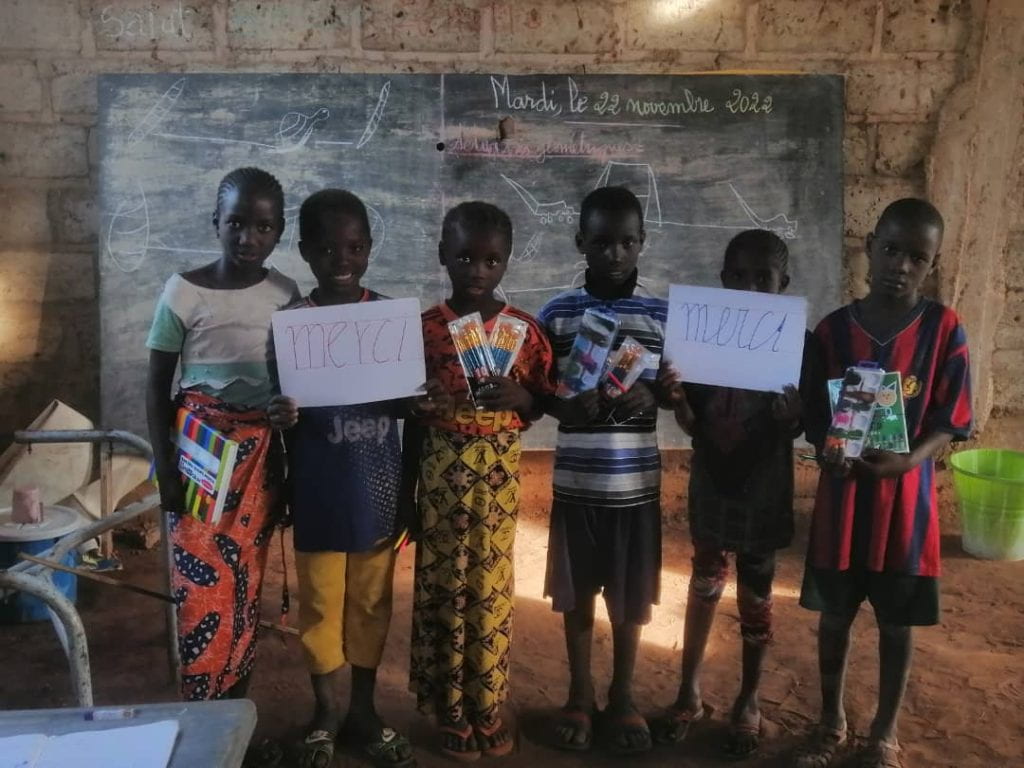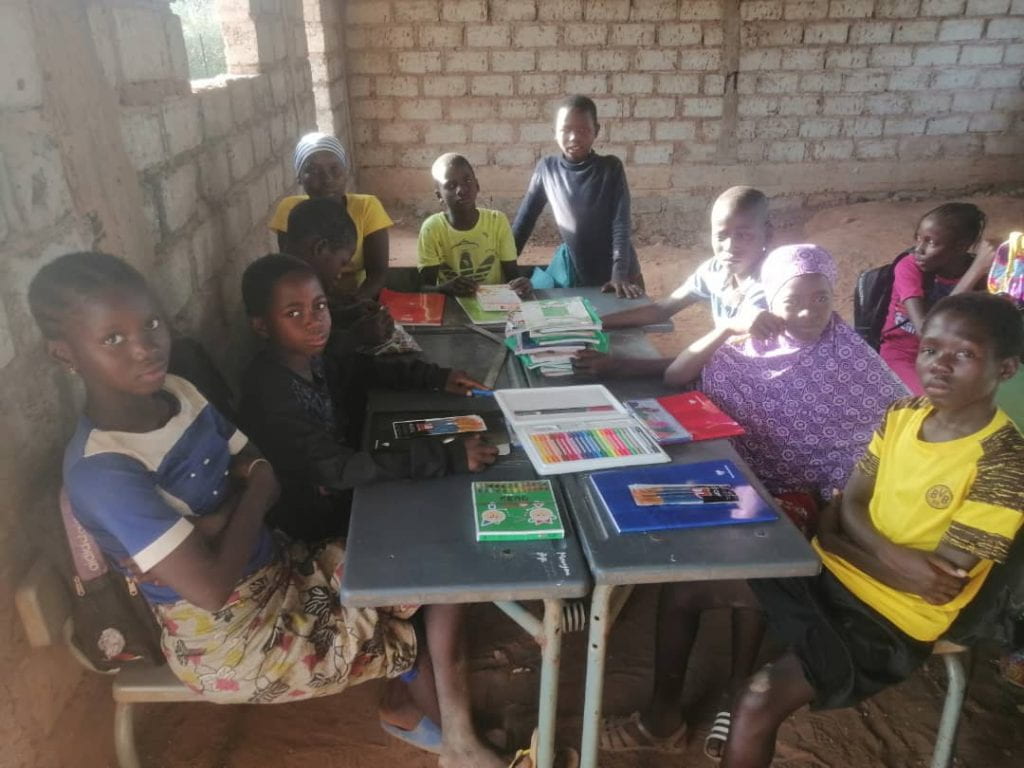Small Change, Better World
Calling all creative minds and changemakers!
This grant program provides up to $3000 of funding so students can gain experience designing and implementing projects that matter. Unleash your creative power or problem-solving skills, and help build a more just, equitable, and sustainable future.
Projects can be carried out anywhere in the world. They must be completed within one year. Both graduate and undergraduate students are encouraged to apply.
Applications for Fall Quarter 2025 will be available from September 29th – November 5th.


The Story of SCBW
Millennials and post-millennials want to be involved in service and philanthropy, but there aren’t many mechanisms designed to support young people—even though they have an abundance of skills, energy and passion.
The SCBW model was conceived a decade ago by three humanitarian workers—Michael Beevers, Richard Matthew and Renard Sexton—working in Sierra Leone. After visiting many villages impacted by a decade of civil war, they realized that most existing programming cannot undertake very small projects, even when these are important to the community and require some external support. From replacing lost musical instruments to finding the parts to a piece of heavy equipment donated from abroad, opportunities exist for small changes to create a better world.
SCBW seed grants give students an opportunity to meet tangible needs in their own communities or in places they have visited and worked in. We hope that the experience gained through these projects will inspire students to continue to take actions to address 21st century challenges in ways that are effective, fair, and appropriate.
Read about some of the inaugural recipients on our Medium, or view a map of projects.
Funding Tracks
Small Change, Better World applications are accepted in three distinct tracks. Read about each opportunity below to find the best fit for your idea.
Track 1: Music and Individual Flourishing
This track encourages students to reimagine the role of music as a medium for personal transformation and individual well-being. Students are empowered to explore and address complex aspects of holistic health, such as self-identity, sleep, cognition, mental health, and pain management, through innovative projects that spark reflection, challenge stigmas and foster collective healing.
Example projects:
- Create a short film that explores how music can address mental health challenges, shape self-identity, and promote emotional healing.
- Develop a workshop that blends music, movement, and dance to demonstrate the therapeutic effects of creative expression on pain management and overall well-being.
- Design a public art installation that uses sound and visual art to raise awareness about the crucial link between sleep, cognition and mental health.
Track 2: Music and Social Change
This track challenges students to explore the transformative power of music as a tool for addressing pressing social issues and fostering community engagement. Students are encouraged to develop projects that leverage music to raise awareness about global challenges like human trafficking, inequality, and social divisions, with the goal of uniting communities, dismantling barriers, and contributing to a more just and compassionate world.
Example projects
- Develop a mobile app that uses music and sound to inspire and encourage users to register to vote, featuring songs, interactive quizzes, and sound bites that promote civic engagement and the power of voting.
- Produce a music video or performance piece that tells the story of human trafficking survivors, using music to raise awareness and advocate for justice.
- Design a mentorship program that pairs local youth with professional musicians or music industry experts to guide them in building careers in the music field, fostering skills in creativity, collaboration, and industry insight.
Track 3: Music, Nature and Futurisms
This track invites students to explore the intersection of music, nature, and innovation as powerful drivers of sustainable change in the face of environmental challenges. Students are encouraged to develop projects that blend creativity with climate action, using music to raise awareness, promote eco-conscious behavior, and shape a healthier, more resilient planet for future generations.
Example Projects
- Create a community garden project that integrates music into the gardening process, using soundscapes and rhythm-based activities to foster sustainable food production and connect participants to the natural world.
- Lead a community workshop where participants learn about climate resilience through music, nature walks, and sustainable practices.
- Design a music-driven campaign challenge, where participants create music using only sustainable or natural materials (e.g., wind instruments, rainsticks, etc.) and share their compositions online to promote awareness of eco-friendly practices in music-making.
Eligibility
We offer grants up to $3000 to support project development, production, and community engagement.
- Applications should be for a finite or one-time, limited scope projects that address a specific need. Think one-time input with a lasting legacy!
- Funded projects should be achievable within a relatively short period of time.
- Applications are open to currently enrolled UC Irvine undergraduate and graduate students. Applicants who receive funding must be in good academic standing and remain students through the duration of their project.
How to Apply
Proposals are accepted on a quarterly basis.
Full details can be found in the application form. Components of the proposal include:
-
- A description of your proposed project and what social or environmental challenge this project addresses. Include how your project aligns with the track you are applying under and your motivation for doing so.
- An explanation of the expected impact and legacy of your one-time/short-term project.
- A description of any partners you will be working with to implement the project and how they are involved. Partnerships should be pre-existing and any approvals from the partner organization must be in-hand before applying.
- Budget narrative – How much you are applying for and how the funds will be spent. Include the rationale for each expense. [Template coming soon]
- Do you have any other funding sources for this project (e.g. GoFundMe)? Explain, briefly, how these funds will be used and whether there is any overlap with potential Small Change/Better World funding.
- A timeline for the project with major milestones. Will the proposed project be completed within 10-15 weeks of receiving the award?
- A short personal bio.
Selection Criteria
- Track selection: Be sure to choose the track that best aligns with your project.
- Clarity and strength of your proposal in addressing a social issue.
- Highlight the power of art or youth engagement in addressing social issues or climate change.
- Potential for community engagement and impact on campus or your local community.
- Feasibility and clarity of your budget.
See the legacy of past Small Change, Better World projects around the world.
FREQUENTLY ASKED QUESTIONS
What types of projects can receive funding?
Small Change, Better World provides funding to a variety of project types. See examples of previously funded projects on the SCBW Map.
For the newly relaunched program, projects that emphasize the role of music , arts, and/or youth engagement in addressing social and environmental issues are eligible.
What is the expected project and funding timeline?
Students are expected to complete their project within one quarter of receiving funding, and must remain a UCI student through the duration the quarter in which they implement their project.
For example, a student who applies for the May 30 deadline can expect to hear results by early June. Students being offered funding will receive an offer letter; if the offer is accepted, the disbursement of funds is initiated by mid-June. The recipient will then be expected to complete their project over the Summer quarter, and submit a post-project survey by November 25.
How much should I ask for?
We’re looking to fund projects that cost under $3,000. You will need to provide an itemized cost estimate to justify the total amount requested.
What types of costs should I itemize?
Your itemized budget will be unique to the goals of your project. Budget should include reasonable estimated costs for any necessary materials, supplies, equipment, taxes, transportation, shipping, delivery, etc.
What is the purpose of the student survey included in the application?
The Blum Center is committed to providing effective programs that make a difference for UCI students and the communities we serve. To help us assess the program, all applicants are required to complete a survey as part of the application process.
The purpose of the survey is to allow Blum Center staff to assess the effectiveness of the program as a whole. We do not use the survey to evaluate individuals, and your survey responses have absolutely no impact on how we review your application. In fact, we won’t even look at your survey responses until after grants have been awarded.
I’m not sure if my project is a good fit. What else is available?
There are many resources at UCI and beyond for funding and support. Depending on the type of project you have in mind, you may want to consider:
- Event-focused support incorporating arts & culture: Illuminations
- Research-focused support: UROP
- Innovative initiatives: The Catalyst Fund
- Large-scale innovations: Big Ideas
- Startup or business support: New Venture Competition
- Startup development and mentorship: Wayfinder Incubator
- Startup fiscal support: Student Start-up Fund
- Long-term sustainable social enterprises: New Venture Competition – Social Enterprise Track
I’ve implemented this project, and there’s still a need. What’s next?
You may be able to utilize Zotfunder, a UCI fundraising platform. Contact the Blum Center staff at blumcenter@uci.edu to discuss whether Zotfunder is the right fit for your project.
